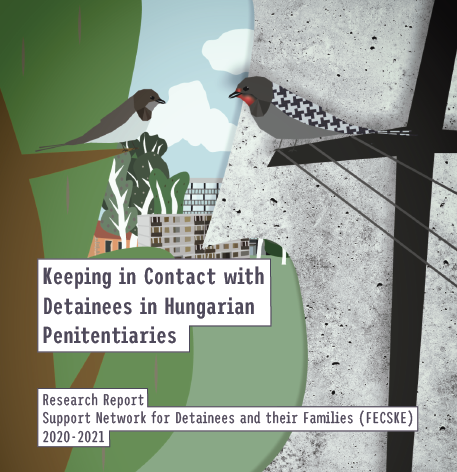Fourteen months of deprivation: detainees’ contact with the outside world during the pandemic
Translation is available for this content
Váltás magyarraVisits to penitentiaries have been banned for more than a year since the outbreak of the pandemic in Hungary. Consequently, no personal contact has burdened detainees and their family members. Alternative forms of communication, such as additional minutes on the phone and Skype were introduced, to compensate for the lack of personal contact. These do not provide a solution to all, as many detainees cannot pay for the extra minutes, or their families do not have Internet access or a proper device to conduct Skype calls – shows the recently founded network for supporting detainees and their family members, FECSKE’s research report.

With nearly 17,000 detainees and their roughly 100,000 relatives (including approximately 40,000 children) affected by prison rules and practices, one of the most important elements in the reintegration of detainees is the preservation of family ties. The Support Network for Detainees and their Families (the Hungarian acronym is FECSKE, which also means the bird swallow in Hungarian) examined the situation of detainees’ contacts with the outside world using public information, Freedom of Information requests, in-depth interviews and questionnaires.
When COVID-19 appeared in Hungary in March 2020, the issue of contact between detainees and their relatives became especially relevant. Visits to penitentiaries, the most direct form of contact were banned until at least the end of June 2021, regardless of whether a detainee had been vaccinated, his/her behaviour and crime committed. At the same time, all restrictions on keeping contact outside the realm of penitentiary institutions were lifted, for example, elderly homes can be visited.
FECSKE’s research shows that the past year has put new, almost unbearable burdens even on tight family relationships of detainees. When in fact strong family contacts may well be the most important support for convicts in preventing recidivism and rebuilding their lives upon release.
Skype contact cannot replace visits, as many detainees and their family members have no access to it. In 2021 January, only half of the penitentiary population had contact through Skype. Many participants of FECSKE’s research complained about poor sound quality and the unpredictable schedule of Skype calls. Detainees were provided with extended minutes on the prison mobile phone, but a lot of them cannot make use of these as the per minute charge is very high (HUF 75/minute, circa €0.3) and there is a deposit fee of HUF 35,000 (circa €90-100) must be paid for the use of the device. Detainees in a poor financial situation who cannot afford these mobile tariffs are significantly disadvantaged, as they are only provided with the opportunity to make free calls for maximum 15 minutes a month.
Many family members of detainees reported on growing tension and distance within the family in the pandemic. For people outside of prison, it is very difficult to bear not knowing how long the total ban on visits will be upheld. “Unfortunately there are no visits and that completely busts us up. Unfortunately, when we talk on the phone, we just fight. It is hard to get through this. If it goes on for a long time, it can ruin a lot of relationships.” – reported a family member to FECSKE.
As Lili Krámer, a criminologist and staff member of the Hungarian Helsinki Committee said, „Over the past five years, we have seen a continuous shift towards restrictive policy and regulation over detainees’ contact. Since 2019, every penitentiary had to install so called »room dividers« in their visitation rooms, which are meter-high and usually made of Plexiglas. Detainees and their family members are not allowed to touch each other the whole time, not even upon arrival and farewell can they hug or kiss one another.”
According to the criminologist, it is imperative to lift the visitation ban as soon as possible. “Even though detainees were started getting vaccinated relatively late, on 28 April 2021, by now two-thirds of them has gotten the vaccination. Therefore, it is time to start gradually lifting the visitation ban as soon as possible. This is not only in the interest of detainees and their families, but also a precondition of peace in prison.”
***
FECSKE – is the acronym in Hungarian for Support Network for Detainees and their Families, it also means the bird swallow in Hungarian. It is a network of former detainees, their family members; and relatives, supporters of people detained in penitentiary institutions as well as academics and professionals, including staff members of the Hungarian Helsinki Committee. They compiled the research report on detainees’ contacts with the outside world too. Members of the network believe that everyone has the right to serve their prison sentence under humane conditions that supports a successful reintegration and helps former detainees to start a new life upon release.